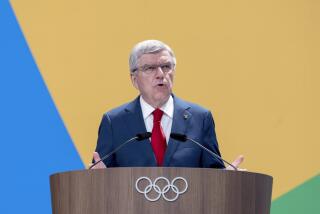IOC Opts to Spare 3 Sports
MEXICO CITY — Baseball, softball and the modern pentathlon won a reprieve Friday with the International Olympic Committee voting to postpone any decision about whether the three sports ought to be eliminated from the Olympic Games until after the 2004 Athens Games.
An IOC panel had recommended the exclusion of the three sports in August. The recommendation was surprising if not stunning -- no sport has been cut from the Summer Games since after the 1936 Games, when the IOC chucked polo. Three months of fierce behind-the-scenes lobbying ensued. On Friday, in presentations to the full IOC assembly, the three sports pleaded for mercy.
In response, the IOC opted -- for now -- to do nothing.
Come 2004, it remains unclear whether the three sports -- or any sport, for that matter -- could be booted as soon thereafter as the 2008 Games in Beijing.
In the nuanced world of Olympic politics, however, much was made clear Friday -- in particular the emerging leadership style and political durability of Jacques Rogge, the Belgian elected last year as IOC president, as well as the empowerment of key constituencies within the Olympic movement, especially the international sports federations and the national Olympic committees.
In the same way he responded at an IOC meeting in February, when the membership raised opposition to the format and wording of certain ethics rules, Rogge showed Friday his willingness to be flexible.
The ethics rules were approved a few months later by the IOC’s policy-making executive board. Now baseball, for instance, has time to prove it can attract U.S. major league stars to the Games.
“It’s an opportunity, not a warning,” Rogge said after Friday’s vote for postponement.
“My style is an open style,” Rogge also said. “I am for dialogue
Rogge also came to office promising a more corporate management style than his predecessor, Juan Antonio Samaranch of Spain. Asked this week if he could have avoided months of furious debate over the three sports by getting more of what business types call a “buy-in” before it was abruptly announced in August that the three were on the block, Rogge laughed.
“You don’t ask turkeys to vote for Christmas,” he said in an interview with The Times. “It would be naive to think that was possible.”
He also said, “I don’t see any political defeat in creating a system of periodic review [of the sports] after each Olympic Games.”
Asked at a news conference if he had misjudged the outcome of Friday’s proceedings, Rogge said, “I am not a naive man. I don’t think I misjudged anything.”
The jarring note to so many Olympic insiders, however, is that the spectacle that unfolded Friday would have been unthinkable during the Samaranch years.
Samaranch would not have allowed a controversial proposal -- such as the elimination of three sports -- to become public if he did not know the outcome of the vote before the proposal became public. Then 39 speakers took to the microphone, far more than would have spoken in the Samaranch era. Not one supported the proposal to cut the three -- unimaginable during the Samaranch years.
“The backstage deals clearly are not done,” University of Chicago professor John MacAloon had said before Friday’s action, adding, “it is a much more open and publicly debated process.”
Or, as Samaranch put it in an interview this week, “Everyone has his own style. I don’t like to lose elections.”
Rogge also does not care to lose. He won a major victory Thursday when the IOC membership voted overwhelmingly not to reinstate visits to cities bidding for the Olympic Games -- a position with which he has long been personally identified.
In the debate over the three sports, Rogge said repeatedly he was “neutral.” He said Friday that debate is essential because sports not in the Games, such as golf, ought to be considered -- but can get in only if others are out. The Summer Games are capped at 28 sports, 300 events and 10,500 athletes.
“I want the IOC members to have their input,” Rogge said.
That they did -- in a way that foretells the new workings of the Olympic movement. Even Dick Pound of Canada, who ran against Rogge for the presidency, said, “I don’t view this as a triumph for Jacques or a defeat for Jacques. That’s immaterial. What’s important is we’ve [launched] the working process to make the Olympic program relevant to the 21st century.”
More to Read
Go beyond the scoreboard
Get the latest on L.A.'s teams in the daily Sports Report newsletter.
You may occasionally receive promotional content from the Los Angeles Times.






